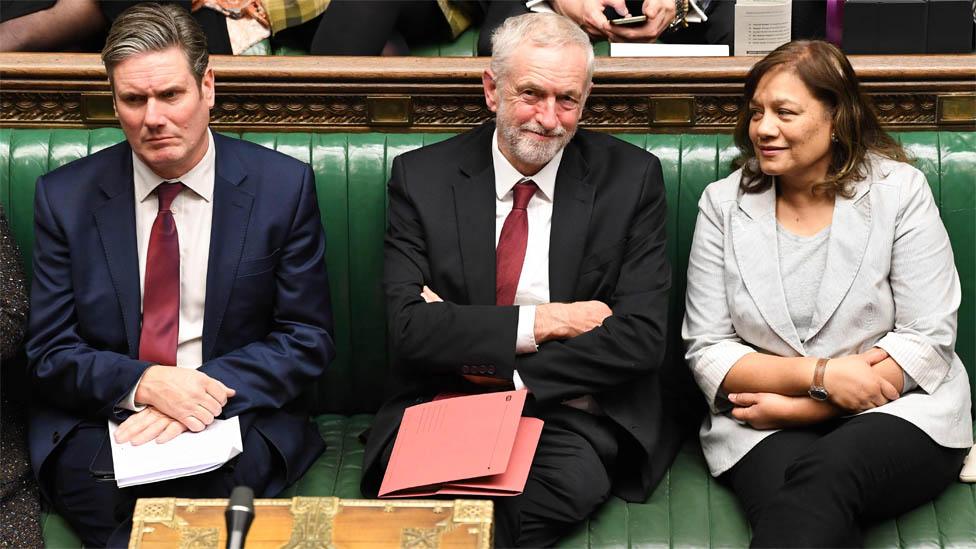Labour, the Brexit vote. And what would they do next?
- Published

Labour is determined to defeat Theresa May when the so called 'meaningful vote' on the Brexit deal is held next month.
It looks like they will get some help to do so from at least some of the prime minister's own MPs.
And with at least a suspicion that Theresa May could try to get her deal - or something awfully close to it - through at the second attempt, Labour waverers don't seem to have much incentive to break ranks on 11 December.
This would risk the ire of party members and very possibly still not deliver enough votes for the deal to pass.
Indeed some of those Labour politicians from Leave areas who had mulled over backing a government-brokered deal, such as Wigan's Lisa Nandy and Stoke's Gareth Snell, have said they won't support this version.
If Labour defeats the government, then what?
Labour's conference policy leaves a new referendum on the table, as an option.
Would Jeremy Corbyn give its his full-throated support on 12 December?
As things stand - always an important caveat in these tumultuous times - no.
The party's emphasis in the run up to the vote won't be on a new referendum, it will be on a "Brexit That Works For You" - a customs union with the EU, tariff-free access to the single market and an EU-level of employment rights as a minimum, amongst other things.

If the deal is rejected, then Labour will initially do one - or both - of the following:
If the prime minister isn't swept from office by her own side, she will again be urged to seek a consensus in Parliament by - above all - erasing her red line on a permanent customs union.
And - certainly if the deal is heavily defeated, possibly even if it's narrowly defeated (that hasn't yet been definitively decided) - a confidence motion can be expected.
That's the way to trigger the general election that Labour says it wants though, in truth, I have found a lack of enthusiasm in some Labour quarters for this, and a wariness amongst some strategists who fear it might help rather than hinder the Conservatives.
But Labour policy is to call for an election before considering other options and a confidence motion, even if defeated, ticks that box.
Then things could get messy
There is a cross-party grouping that would favour membership of the European Free Trade Association - countries outside the customs union but allowed to trade freely with the single market in return for accepting its rules - over either a revised deal or another referendum.
As I understand it, while a "People's Vote" - or public vote to use Labour's terminology - is on Mr Corbyn's table, he is still reluctant to bite.
Insiders say they haven't had any inkling that he has become more enthusiastic about the prospect. Leave campaigner Kate Hoey thinks he will keep the option on the table for so long it will "go off".
And those involved in the campaign for a new referendum haven't had any signals that Mr Corbyn is about to endorse them.
Their hope is that more "pragmatic" members of the shadow cabinet - and they include John McDonnell in this - will be able to persuade him, especially given the support of younger left-wing party members for a referendum, if they can't get an election.
And I know of a close Corbyn ally who is worried about whether his leader's long-standing internal opponents will be able to "weaponise" the Europe issue against him if he doesn't back another vote further down the line.
That said, it would be wrong to portray Mr Corbyn as a lone Labour figure trying to push back a referendum tide.
There are different shades of opinion in the parliamentary party and there are some (formerly) staunch Remainers who are worried about the risks a new referendum would carry.
'Even more risky'
It has been said to me that it's significant that Diane Abbott is now publicly wary of being seen to want to re-run a referendum.
The party's own polling has been showing a slight erosion in support for Remain.
The People's Vote campaign, though, would point to polling it has commissioned suggesting the overwhelming majority of members back not only a new vote but staying in the EU. And it would argue it's even more risky for Labour to appear to be sitting on the fence.
Near unity in opposing Theresa May's deal on the Labour benches may start to dissolve after victory on 11 December, rather than after defeat.
But Theresa May hasn't lost yet.
So here's another important caveat: If a week is a long time in politics these days, a fortnight is an absolute aeon.
